Understanding the Role of a Surf Captain
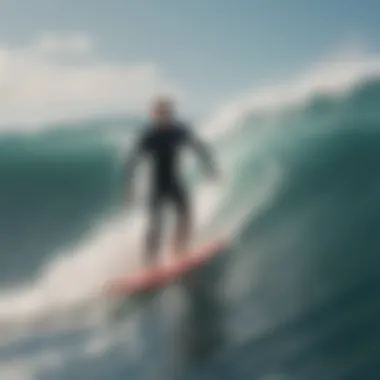
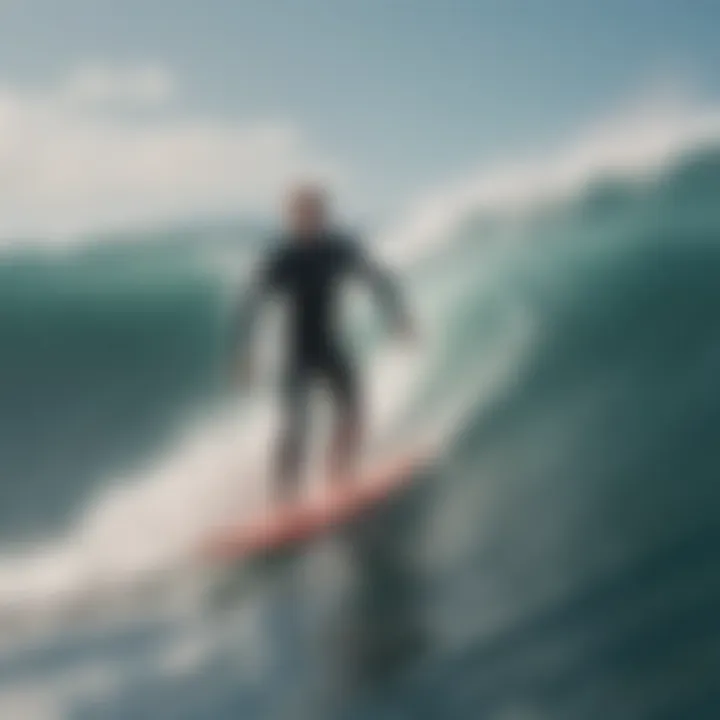
Intro
Surfing isn’t just about waves and the thrill of riding them. It embodies a culture of camaraderie, respect for nature, and a collective passion that thrives within the surfing community. At the heart of this vibrant culture lies the surf captain, a pivotal figure who orchestrates the harmony between surfers and the ocean. A surf captain goes beyond merely leading the pack; their role intertwines various responsibilities that enhance the entire surfing experience.
The art of guiding a group of surfers through their journey depends significantly on the captain's ability to assess conditions, manage team dynamics, and foster an environment conducive to learning and fun. Each wave tells a story, and with the right captain, surfers of all levels can not only ride those waves but also embrace the deeper lessons the ocean has to teach.
Understanding the nuances of a surf captain's role involves peeling back layers of techniques, equipment, and interpersonal skills that shape the surfing adventure, framing an exploration of what makes a surf captain indispensable.
Surfboarding Techniques
Beginner Tips for Mastering the Basics
Stepping onto a surfboard for the first time can feel like being thrown into the deep end without floaties. It's nerve-wracking yet exhilarating. For a beginner, knowing the right techniques can be a game-changer. Here are some pointers to master the basics:
- Practice Balance: A solid stance is foundational. Keep your feet shoulder-width apart and slightly bend your knees. This stance allows for better balance when the board meets the waves.
- Learn Paddling: Good paddling can make a world of difference. Use your arms efficiently, reach forward to dig with your hands, and pull through the water to gain momentum.
- Understand Wave Timing: Hold back until the wave builds. If you rush, you’ll capsize before you even stand up. Watch the water and find that sweet spot when the wave pushes towards the beach.
Advanced Techniques for Seasoned Surfers
Once the basics are second nature, seasoned surfers crave more. Advanced techniques bring depth to their surfing abilities, allowing them to tackle bigger waves and complex moves. Key aspects include:
- Carving: This technique involves shifting your weight while turning on the wave to create clean, smooth lines. It’s about finesse and control, not just speed.
- Duck Diving: A must-have skill for paddling through larger waves. Dive under the oncoming wave by pushing the nose of your board down, tucking your body, and then popping up on the other side.
- Backside vs. Frontside Riding: Understanding your preferred stance greatly influences your performance. Whether you ride regular or goofy, mastering the differences can elevate your game.
“A surf captain doesn't just surf; they navigate the flow of the ocean and the spirit of the team.”
Surfboard Equipment
Essential Gear for Every Surfboarder
Having the right equipment can make or break a surfing experience. Some essentials every surfboarder should consider include:
- Surfboard: Depending on skill level, the type of board varies. Beginners may benefit from longboards for stability, while experienced surfers often choose shorter boards for agility.
- Wetsuit: Comfortable and warm suits are necessary for cooler waters. They aid in flexibility while protecting from the elements.
- Leash: A leash is critical; it not only keeps the board near you but also prevents it from becoming a projectile hazard towards other surfers.
Reviews of the Latest Surfboards on the Market
Picking the right surfboard from the myriad of options available today can feel like choosing the best apple from a bushel. Recommendations often hinge on personal preferences, yet it's vital to know what’s trending and proven effective:
- Channel Islands Surfboards: Known for performance and innovation, their model “Druid” caters exceptionally well for various conditions.
- Lost Surfboards: Their “Driver” model is a favorite among advanced surfers, offering great maneuverability and speed.
- Soft Top Boards: Perfect for beginners, brands like Wave Bandit provide a forgiving ride while ensuring safety.
Exploring the drowned secrets of surf equipments and techniques will surely help in creating a well-rounded surf captain. Each wave you ride and the insights you gain will deepen the connection between the surf captain, their crew, and the ocean itself.
Prolusion to Surf Captains
The world of surfing is not just about catching waves; it’s a blend of art, skill, and community. Central to this community are the surf captains, who play a pivotal role in enhancing the surfing experience. As such, understanding the nuances of their responsibilities and the historical significance of their position opens a window to the broader culture of surfing.
In this section, we’ll dive into the essence of what it means to be a surf captain. Positioning themselves between the waves and the adventurers, they act as both guides and leaders, shaping the future of surfing for individuals at various skill levels.
A surf captain is more than just an experienced surfer. They embody the soul of the surfing community, blending a vast knowledge of the ocean with leadership skills that empower others. Their role can be categorized into several key areas of responsibility:
- Navigation: A surf captain must possess a deep understanding of surf conditions, tides, and safety protocols.
- Instruction and Mentoring: Providing valuable insights, a surf captain teaches novice surfers about techniques and safety measures.
- Risk Management: They assess the environment constantly and make tough calls for everyone's safety.
Ultimately, a surf captain is a mentor, a friend, and, often, a lifeline in turbulent waters. They inspire confidence, ensuring that the thrill of surfing does not overshadow the importance of safety and respect for nature.
Historical Context of Surf Captains
To appreciate the present, we must understand the past. The role of surf captains has evolved significantly over the years. Surfing originated in ancient Polynesia, where it was not just a sport but deeply embedded in cultural traditions. In those early days, the best surfers were often seen as leaders, guiding their peers in both surfing and community practices.
As surfing spread globally, the need for organized groups became apparent, particularly in the 20th century. Surf clubs began to form, and with them emerged a clear need for leadership. Through competitions, teaching sessions, and community events, surf captains have always played a vital role in fostering teamwork and a sense of belonging among surfers.
The confluence of culture, history, and camaraderie shaped the surf captain's role into what it is today—a vital link in the chain that connects the waves, the surfers, and the surrounding world.
"A captain is not just a title; it is a commitment to steering, guiding, and nurturing the spirit of surfing for those who ride the waves."
In summary, this introduction highlights the significance surf captains hold within the broader surfing culture. Their leadership and knowledge not only enhance the surfing experience but also carry the legacy of the sport forward.


Key Responsibilities
Navigating the Surf Environment
One of the primary responsibilities of a surf captain is to navigate the surf environment, a task that requires acute awareness of both the ocean's characteristics and the surf conditions on any given day. It's not just about choosing the right spot to catch waves; it’s also about understanding the shifting tides, local currents, and potential hazards lurking beneath the surface.
Imagine this scenario: a surf captain stands by, eyeing the horizon. Clouds are gathering, and the wind is picking up, creating an unsettling choppy swell. The captain must gauge whether the wave conditions are safe for their group. There’s an art to this; knowledgeable captains can often spot the signs that an incoming storm is brewing or that a treacherous rip current is forming, allowing them to make split-second decisions that could mean the difference between thrilling surf and dangerous situations.
Not only do surf captains need to read the water, but they also must communicate effectively with their crew, ensuring that everyone understands the safety measures in place. They might say something like, "If you see the wave peeling to the left, that’s where you want to go, but keep an eye on the left side for potential rocks." This hands-on guidance is essential for developing navigational skills among surfers.
Instructing and Guiding Surfers
Beyond navigation, instructing and guiding surfers through their journey is a critical duty for surf captains. The ability to impart knowledge about the nuances of surfing—from paddling techniques to positioning on the board—is essential for fostering confidence and proficiency in their crew.
Let’s take a look at the new surfers. They often ride the waves of enthusiasm but can be easily overwhelmed by challenges and frustration. A captain adept in teaching will tailor their approach, assessing each surfer's skills and providing personalized feedback. Might they suggest, "You’re using too much muscle; try relaxing your body and let the wave do the work," in a supportive, encouraging tone? The outcome is twofold: enhanced skills for the surfers and increased trust in their captain.
Through demonstrations, positive reinforcement, and patience, captains cultivate an environment where learning thrives. There’s a certain rhythm to these interactions—similar to the ocean itself; the dynamic is ever-changing and requires a nuanced understanding of when to step in and when to let surfers experiment.
Safety Protocols and Risk Management
Last but certainly not least, a surf captain’s responsibilities encompass safety protocols and risk management. The ocean, while beautiful, poses numerous risks, and it’s the captain’s duty to mitigate these dangers effectively. This involves not only understanding the weather patterns but also preparing the surfers for a variety of scenarios that may arise.
Before setting out, a surf captain might conduct a safety briefing, highlighting potential hazards such as rip currents or rocky outcrops, instilling a conscious awareness in their team.
"You can’t control the wave, but you can control how you react to it."
By instilling this mindset, captains empower their surfers to make prudent decisions on the water. It’s about fostering an awareness that leads to proactive risk management rather than reactive responses.
Moreover, surf captains often need to have first aid training and emergency protocols ready at hand. Should a surfer experience a wipeout or injury, having a captain who knows how to assess the situation and provide appropriate care is paramount. This aspect of responsibility creates a foundation of trust between the captain and the surfers, reinforcing the idea that their safety is a top priority.
Navigating the surf, instructing team members, and guaranteeing safety all intertwine into the pivotal responsibilities of a surf captain. Each of these roles not only enhances the overall surfing experience but also contributes to a community built on trust, respect, and shared joy in the waves.
Essential Skills for Surf Captains
Expertise in Surfing Techniques
First and foremost, a surf captain must have a deep-seated expertise in surfing techniques. This expertise encompasses fluid movements on the board, an understanding of wave dynamics, and the ability to read the water. A captain with solid technical skills can demonstrate proper techniques to their crew, which is crucial for fostering learning and improvement.
Moreover, this expertise serves as a foundation for developing trust between the captain and the surfers. When surfers see their captain in action, they gain confidence in the guidance provided. Whether it’s executing a perfect bottom turn or handling a wipeout, such skills make learning more accessible and enjoyable for newcomers.
"A skilled captain creates an environment where even the most timid surfers feel encouraged to push their limits."
Strong Communication and Leadership
Following technical skills, strong communication and leadership are vital attributes for any surf captain. Communication isn’t just about shouting instructions; it involves actively listening and engaging with the team. A captain who communicates effectively can anticipate the needs of their surfers, adjusting plans on the fly due to changing conditions or differing skill levels.
Furthermore, leadership in surfing often means leading by example. A great captain should exemplify respect for the ocean and fellow surfers, showcasing not only technical prowess but also sportsmanship. Leaders are expected to inspire collective effort and foster a sense of belonging. When captains share their experiences and stories, it builds resilience in their crews, reminding everyone that challenges are part of the journey.
Decision-Making Under Pressure
Lastly, the ability to make decisions under pressure distinguishes good surf captains from the great ones. Surfing conditions can change in an instant, from gentle waves to turbulent swell. During such moments, a captain must assess the situation quickly, weighing safety against the thrill of taking on bigger waves.
The decision-making process in these tense moments requires an analytical mind, intuition developed through experience, and a bit of guts. The consequences of poor decisions can range from disrupted plans to serious safety risks. Therefore, being able to evaluate risks accurately and make the right call can mean the difference between a fun day on the waves and a disaster.
In summation, the essential skills for successful surf captains stretch beyond surfing alone. Mastery in surfing techniques, effective communication and leadership, alongside decisive action in high-pressure situations, all contribute to a fruitful surfing environment. These skills are not merely beneficial; they are critical in nurturing the next generation of surfers and leaders in the water.
The Social Dynamics of Surfing
The world of surfing is not merely about catching waves; it's also about the relationships forged in the lineup. The social dynamics within this community are rich and multifaceted, significantly shaping the experience for all involved. For surf captains, understanding these dynamics is paramount as they directly affect team morale, safety, and overall enjoyment on the water.
Building Team Cohesion
Team cohesion is the glue that holds a diverse group of surfers together, especially when they are confronting unpredictable ocean conditions. A surf captain acts as the engine driving this bond, often needing to navigate the different personalities and skill levels present within their team. It's crucial that every member feels valued and recognized, fostering an environment where collaboration flourishes.
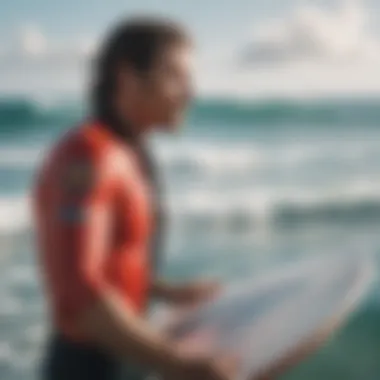
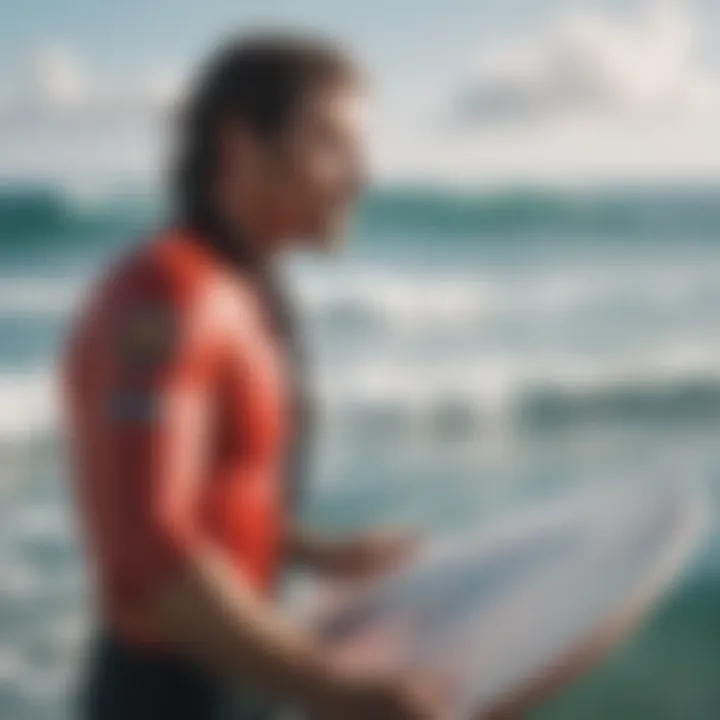
Several strategies can enhance this cohesion:
- Open Communication: Keeping lines of communication clear and consistent helps avoid misunderstandings. When captains encourage honest dialogue, surfers will feel more comfortable sharing their concerns or suggestions.
- Shared Goals: Establishing common objectives, whether it’s perfecting a certain trick or maximizing time on the water, aligns the team's focus and fosters a sense of unity. By celebrating small victories together, the group builds trust and camaraderie.
- Group Activities: Engaging in team-building activities off the surfboard can translate to improved synergy during surf sessions. Events like beach clean-ups or social gatherings create shared experiences that strengthen relationships.
In essence, a surf captain's ability to cultivate team cohesion not only enhances the surfing experience but also contributes positively to each surfer's growth.
Fostering an Inclusive Environment
An inclusive environment is the backbone of a healthy surf culture. Surf captains play a vital role in ensuring that every surfer feels they belong, regardless of their background or skill level. Embracing diversity within surfing communities enriches the overall experience while paving the way for innovation and creativity on the waves.
Considerations for fostering inclusivity include:
- Encouraging Participation: Captains should actively invite surfers of all levels to contribute to discussions about the session or area conditions. This openness invites fresh perspectives and insights that can enhance decision-making.
- Emphasizing Respect: Mutual respect is integral to inclusivity. Surf captains illustrate this through their actions—acknowledging everyone, regardless of skill, and promoting a culture where encouragement supersedes competition.
- Providing Resources: Accessibility in terms of information, lessons, or equipment can drastically affect participation. Offering resources to newcomers not only helps with their technical skills but also fosters a warm atmosphere where everyone feels welcome to learn.
Overall, a surf captain who prioritizes inclusivity not only fosters a harmonious environment but also enhances the overall integrity and spirit of the surfing community.
A surf captain’s influence stretches beyond the surf; they shape the culture, attitudes, and experiences of the surfers they guide. Their leadership is crucial for nurturing a community that is welcoming, supportive, and ready to ride any wave that comes their way.
Challenges Surf Captains Face
Surf captains carry a unique set of responsibilities that transcend mere navigation of waves. The quintessential surf experience is punctuated by challenges that are as unpredictable as the ocean itself. Understanding these challenges is vitally important. Not only do they shape the nature of a surf captain's role, but they also influence the overall surfing experience for the crew. When we talk about challenges, we're diving into the complexities that test the skills, patience, and creativity of surf captains.
Adverse Weather Conditions
Adverse weather conditions can be like a double-edged sword—gaining the surf captain crucial experience but also posing serious risks. A surf captain needs to be able to interpret weather patterns and ocean forecasts like it’s second nature. Strong winds, fog, and sudden storms can turn a day of fun into a precarious situation. For instance, imagine being out on a surf trip, and dark clouds roll in, signaling an impending downpour. The surf captain’s ability to swiftly assess the situation and make prompt decisions could mean the difference between a safe return and a dangerous predicament.
Preparation is key here.
- Checking local forecasts
- Monitoring surf reports
- Ensuring that the crew is informed about the potential for sudden changes in weather.
Captains often face the dilemma of whether to proceed with their plans or call them off entirely. Being able to gauge the mood of the crew while handling these risks can be quite the balancing act.
Dealing with Diverse Skill Levels
Harmony in a surfing crew often hinges on the diverse skill levels present. A surf captain stands as a central figure who not only leads but also harmonizes various abilities. If you have seasoned surfers riding alongside novices, it can create a challenging atmosphere.
The captain must be able to tailor instructions for all skill levels, ensuring that everyone is both safe and engaged. For example, experienced surfers may grow impatient while waiting for beginners to catch up. Here’s where the captain’s ingenuity shines. They can foster a sense of camaraderie by organizing mixed-level activities that facilitate learning. Everyone could benefit from expert tips, like focusing on foot placement or paddling techniques. Captains often utilize these diverse skill sets to create an inclusive environment, which ultimately enriches the overall surf adventure.
Conflict Resolution Among Crew
Navigating the waters is not the only thing surf captains need to be good at; they must also become adept mediators. Conflicts can arise from any number of sources—be it due to competitive spirits, miscommunication about turns on the waves, or even personal grievances that switch on like a light bulb.
A surf captain should cultivate a strong team dynamic. When tensions flare, it becomes crucial to step in and address the issue. A captain can utilize techniques like active listening, encouraging all parties to express their concerns freely. Establishing ground rules at the outset can also be helpful. Here’s a list of things to consider:
- Set clear expectations about behavior in the water.
- Encourage open dialogue, allowing crew to voice concerns.
- Promote teamwork through group activities.
Ultimately, the surf captain's ability to unify the crew will ensure not only an enjoyable outing but also a shared sense of purpose and community amongst the surfers.
Impact of Surf Captains on Surf Culture
The surf captain's role extends well beyond simply guiding surfers through waves. These leaders are pivotal in shaping the culture surrounding surfing. The way a surf captain interacts with their team and the local surf community can have lasting effects on attitudes toward both the sport and the environment. Understanding the impct of surf captains is vital for anyone involved in the surfing community, from casual surfers to instructors eager to inspire others.
Mentorship and Skill Development
One critical aspect surf captains contribute to surf culture is their role as mentors. They don’t just teach surfing; they foster a culture of learning and improvement. New surfers often feel intimidated, especially in competitive places like Malibu or Huntington Beach. A savvy surf captain creates a safe and welcoming environment.
For example, consider a surf captain leading a crew of novices on a sunny afternoon. Rather than throwing them into the depths of challenging waves, the captain may start with fundamental skills, like paddling and balance.
This systematic approach instills confidence among newcomers. They learn not just how to ride a wave but also how to appreciate the ocean. Mentorship allows surf captains to cultivate connections that transcend beaches and boards. Here’s how mentorship benefits surf culture:
- Skill Progression: Adaptive teaching methods cater to varying skill levels.
- Confidence Building: Positive reinforcement leads to decreased anxiety for learners.
- Community Bonding: Stronger relationships among surfers foster support and camaraderie.
"The ocean is a powerful teacher; it's the surf captains who help us read its lessons."
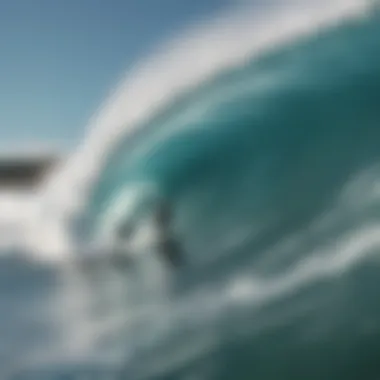
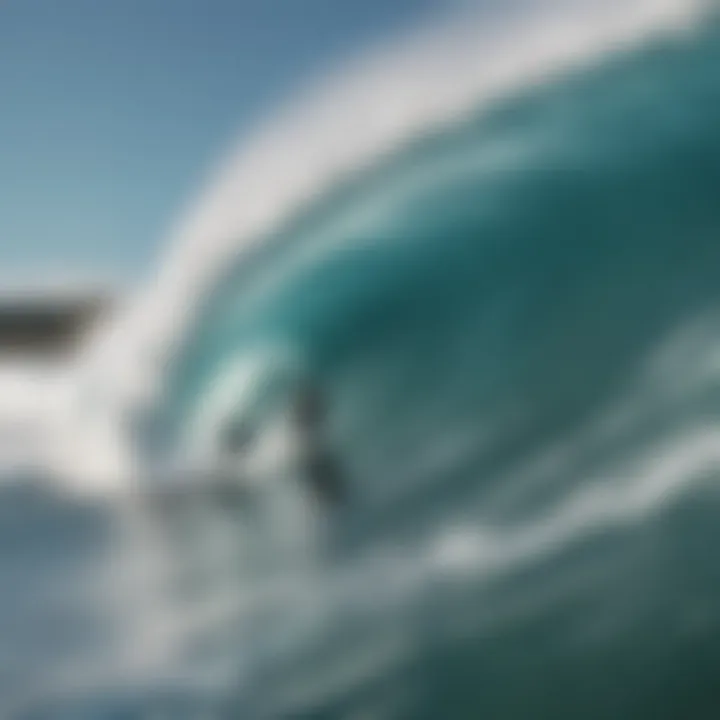
Promoting Environmental Awareness
In today's world, where climate change threatens oceans and beaches, surf captains play a crucial role in promoting environmental awareness. They act as ambassadors, urging their teams to respect and protect the precious ecosystems they enjoy. Through organized beach clean-ups or educational sessions on sustainable practices, they engage surfers in meaningful activism.
For instance, when a surf captain emphasizes the importance of eco-friendly wax or encourages using reef-safe sunscreen, they exemplify a broader commitment to ocean health. It’s about blending the surfing experience with an understanding of one’s impact on the environment.
Here are some effective methods surf captains use to promote environmental awareness:
- Local Education: Hosting workshops about marine ecosystems, pollution, and local wildlife conservation.
- Practical Actions: Involving surfers in initiatives like plastic clean-up drives post-surf.
- Collaboration with NGOs: Partnering with environmental groups can amplify efforts in conservation.
As a result, the surf culture becomes not just a collection of individuals but a collective community dedicated to preserving what they love. This synergy between surfing and environmental stewardship is essential for the sustenance of their beloved waves.
Case Studies of Prominent Surf Captains
Exploring case studies of surf captains shines a light on the diverse qualities and leadership styles that define successful figures in the surfing world. These leaders are not merely guides; they embody the spirit of the surf culture and profoundly impact their communities. By examining their individual journeys and contributions, we gain insights about the essence of surf leadership and the vibrant culture that surrounds it.
Profile of a Legendary Surf Captain
Consider the story of Laird Hamilton, a legendary surf captain renowned for his innovative techniques and adventurous spirit. Hamilton didn't just ride waves; he reshaped the very definition of surfing. His approach to big wave surfing is often seen as groundbreaking. Utilizing tow-in surf technology, he brought many techniques from windsurfing and other disciplines into play.
- Innovative Techniques: Laird's insatiable quest for the ultimate wave led to his involvement in the birth of tow-in surfing—allowing surfers to reach previously unattainable waves. This not only changed how waves were approached but also affected training and skill development within the surfing community.
- Commitment to Safety: As a captain, his emphasis on safety protocols and risk management set a standard for aspiring surf leaders. Hamilton's ability to navigate treacherous conditions has fostered a culture of preparedness among surfers.
- Mentorship: Beyond his skills, Laird has often taken younger surfers under his wing, passing on his knowledge and instilling values that go beyond the sport. This mentorship creates a lineage of surfers who embody similar styles and principles.
Such profiles underline a critical element in the realm of surf captaining—the combination of skill, safety, and mentorship helps cultivate a community that thrives on shared experiences and growth.
Innovations Introduced by Modern Surf Captains
Modern surf captains are not just drawing from traditions; they are actively molding the future of surfing through various innovations. The likes of Jamie O'Brien, known for his social media reach and unique approach to experiential surf content, are illustrating the evolving responsibility of surf leaders in the digital age.
- Social Media and Surf Culture: By chronicling their surfing adventures on platforms like Instagram and YouTube, these captains have redefined how surf culture is perceived and shared. They engage with their audience directly, inspiring potential surfers to take up the sport or explore lesser-known spots.
- Eco-Initiatives: Forward-thinking surf captains are leading the charge on environmental awareness, integrating sustainability into their practices. Notably, Kelly Slater has been at the forefront, advocating for ocean conservation and the use of eco-friendly surfboards. This trend not only promotes ecological responsibility but also aligns surf culture with global efforts to protect our oceans.
- Technological Advancements: Innovations like smart surfboards equipped with sensors are becoming more common. These advancements help surfers track their performance while also providing real-time data to surf schools, enabling better training methodologies and enhancing safety measures.
In summary, the case studies of surf captains like Laird Hamilton and Jamie O'Brien reveal the multifaceted nature of leadership in surfing. They highlight the significance of creativity and responsibility, emanating from past achievements while also embracing future possibilities.
The Future of Surf Captaining
When we look at the horizon of surf captaining, it’s clear that this role is not static; it's evolving for today’s modern climate. As we witness shifts in oceanic patterns and environmental consciousness among surfers, surf captains are now required to wear multiple hats. This evolution isn't merely an adjustment but a necessity, fused with responsibility that extends beyond the waves. Here are a few crucial elements shaping the upcoming landscape of surf captaining:
- Integration of Technology: As surf forecasting technology improves, captains must adapt by using apps and tools that enhance decision-making on what surf spots to choose. They can no longer rely solely on instinct; hard data is becoming an invaluable asset.
- Environmental Advocacy: Moving forward, surf captains are expected to advocate for sustainable practices. This includes educating surfers about respecting marine ecosystems and advocating for coastal preservation. Their role is morphing into that of an environmental steward as well as a guide.
- Catering to All Skill Levels: With increasing interest in surfing among people of all ages and skills, the need for surf captains who can tailor experiences is growing. They must develop programs that cater both to beginners and seasoned surfers to ensure everyone finds their place on the waves.
Adapting to Changing Surf Conditions
One cannot ignore the inevitable changes that accompany climate conditions. Surf captains find themselves at the forefront of these shifts, needing to develop a keen understanding of different surf conditions. This competence is not just a nice-to-have; it's essential. Surfers depend on their captains to provide a safe and enjoyable experience even when nature throws a curveball.
Captains who excel in adaptability are often those with extensive experience and a specific intuition for interpreting sea patterns. They need to stay updated with weather reports and understand how wind patterns, swell size, and tides contribute to surf quality. Moreover, incorporating training sessions that help surfers recognize these signs can become part of a surf captain's strategy, ensuring that all are prepared for sudden changes.
Emerging Trends in Surf Leadership
- Focus on Mental Health: Recognizing the impact of surfing on mental well-being is becoming vital. Surf captains are increasingly encouraging practices like mindfulness and relaxation techniques, helping surfers not just ride waves, but navigate their personal challenges.
- Community Engagement: More than ever, surf captains are seen as community leaders. Organizing clean-up drives, supporting local artisans, and promoting local surf culture are now integral to their responsibilities. They bolster bonds within the surfing community while fostering a sense of belonging.
- Diversity and Inclusion: As the surf culture becomes more inclusive, surf captains play a pivotal role in this shift. They need to foster environments where everyone, irrespective of background or skill level, feels welcome. This transformational leadership can redefine what it means to participate in surf culture.
The landscape for surf captains is shifting. The future holds a promise of enriched experiences that merge tradition and innovation, full of opportunities for captains to expand their influence both on and off the water.
Ending
The Enduring Legacy of Surf Captains
The legacy of surf captains is like the ripples in a still pond; they spread wide and touch many lives. These leaders often become mentors, shaping the journey of new surfers with wisdom that's been forged through their experiences. They instill values that go beyond surfing techniques, emphasizing respect for the ocean and the environment, promoting safety, and nurturing camaraderie among crew members. Surfers who come under their guidance often carry these lessons forward, passing on knowledge and passion for years to come.
In many communities, surf captains are seen as local legends. Take the case of someone like Laird Hamilton – his influence on big wave surfing extends past mere technique; it’s about attitude, a willingness to push boundaries, and respecting the ocean. The legends left behind by surf captains remind us that every swell conquered and every wipeout endured contributes to a rich tradition that honors both the ocean and the surf community.
“To surf is like to dance with nature; a captain leads, the crew follows.”
Encouraging New Generations of Surf Leaders
Fostering new surf captains is crucial to sustaining the vibrancy of the surfing culture. Surf captains are responsible for taking the initiative in mentoring and encouraging the next generation. They recognize the fresh talent emerging in the surf community and make a concerted effort to nurture it. This involves not just teaching how to ride waves effectively, but also emphasizing leadership qualities, ethics, and community involvement.
New leaders can also look to mentors for guidance on how to address contemporary challenges uniquely faced by today's surfers. Topics such as inclusivity in surf culture, environmental sustainability, and the need for greater safety measures demand attention.
A few practical initiatives surf captains can adopt include:
- Hosting Surf Clinics: These are not just skill-based but encompass leadership training and environmental discussions.
- Creating Community Programs: Focus on outreach to underrepresented groups; this could mean collaborating with schools to introduce surfing as a healthy lifestyle choice.
- Promoting Environmental Awareness: Engaging the local community in beach clean-ups and eco-campaigns ensure that the love for surfing translates into protection for surf spots.
By setting a strong example, a surf captain ensures that integral values are carried forth and evolve along with the sport, ensuring that the rich legacy of surfing leadership continues to thrive.















